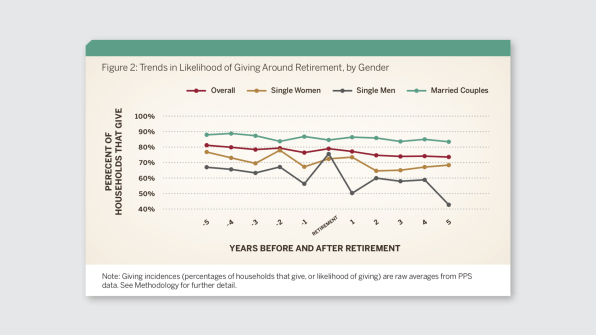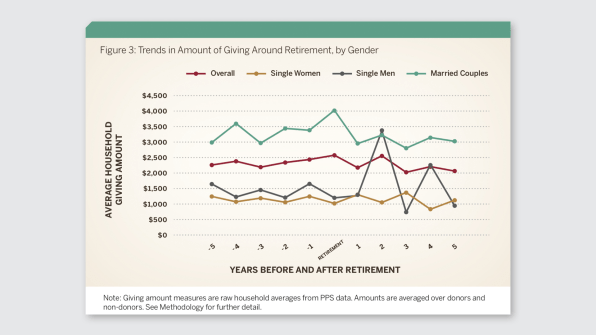Charitable giving is retirement-proof–except for single men
Baby boomers are living longer after they retire, and spending less once they do, to compensate for living indefinitely on a fixed budget. For the typical retiring boomer household (average income: around $75,000) researchers found that spending drops by about 16% among those who are five years before retirement or five years after. At that same time, the amount they’re willing to give to charity stays relatively steady. In fact, the likelihood of giving among the same group of people declines just 4% overall, even as their spending plummets.
When looking at just how generous people act as they age, the likelihood of people giving actually increases a bit between age 60 and 70. “While giving may decline slightly for some households immediately around retirement, it rebounds after a short period of time,” notes a new report by the Women’s Philanthropy Institute at University of Indiana, analyzing a subset of broader data collected in the Panel Study of Income Dynamics, a nationally representative sample of people living around the country.
The difference is that married couples and single women are far more likely and reliable givers than single men. As you can see in the chart below, in the half-decade before and after retirement, between 85% and 90% of married couples expect to continue giving. The rate is lower among single women (with a high of nearly 85% and low of 65% depending on the exact time interval) but far lower for men (more like 75% to 45%).

In terms of actual giving power, it makes sense that the expectation of couples appears to often be nearly double that of individuals, fluctuating between $3,000 and $4,000 annually. Women may give less than men, but they often likely made less in their career because of wage inequalities. The generosity of single women is particularly noteworthy given that most are expected to live longer than their male peers.

One obvious takeaway is that single men—even retired ones—may have more self-centered priorities (the report notes an emphasis on travel and recreation that may explain the difference). Many of these trends appear to be rooted in what givers are taught to value early on. Specifically, single women are historically more likely to donate to charity and volunteer than single men–and women in general tend to be more inspired by a family history of giving than men.
As the study reports, “How people address charitable giving later in life is a continuation of patterns established much earlier.” People—especially men—might be more charitable if they were taught to act that way throughout their lives. That’s a valuable lesson for any group wondering how to encourage future generations to stay philanthropically involved as they age.
(40)



